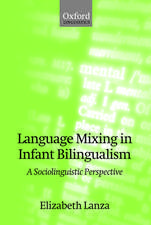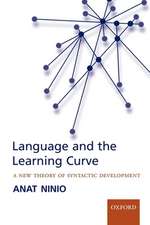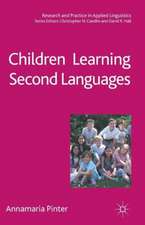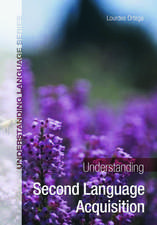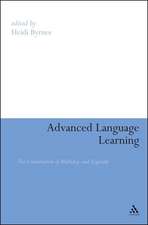New Media and Perennial Problems in Foreign Language Learning and Teaching: Second Language Learning and Teaching
Editat de Liliana Piasecka, Małgorzata Adams-Tukiendorf, Przemysław Wilken Limba Engleză Hardback – 11 dec 2014
| Toate formatele și edițiile | Preț | Express |
|---|---|---|
| Paperback (1) | 385.25 lei 6-8 săpt. | |
| Springer International Publishing – 23 aug 2016 | 385.25 lei 6-8 săpt. | |
| Hardback (1) | 377.22 lei 38-44 zile | |
| Springer International Publishing – 11 dec 2014 | 377.22 lei 38-44 zile |
Din seria Second Language Learning and Teaching
- 15%
 Preț: 645.47 lei
Preț: 645.47 lei - 15%
 Preț: 647.27 lei
Preț: 647.27 lei - 15%
 Preț: 640.55 lei
Preț: 640.55 lei - 18%
 Preț: 965.34 lei
Preț: 965.34 lei - 15%
 Preț: 643.34 lei
Preț: 643.34 lei - 15%
 Preț: 646.11 lei
Preț: 646.11 lei - 15%
 Preț: 647.08 lei
Preț: 647.08 lei - 15%
 Preț: 650.04 lei
Preț: 650.04 lei - 15%
 Preț: 645.79 lei
Preț: 645.79 lei - 15%
 Preț: 645.60 lei
Preț: 645.60 lei - 15%
 Preț: 642.83 lei
Preț: 642.83 lei -
 Preț: 377.22 lei
Preț: 377.22 lei - 15%
 Preț: 638.76 lei
Preț: 638.76 lei - 24%
 Preț: 777.87 lei
Preț: 777.87 lei - 15%
 Preț: 645.47 lei
Preț: 645.47 lei - 15%
 Preț: 638.43 lei
Preț: 638.43 lei - 18%
 Preț: 736.01 lei
Preț: 736.01 lei - 18%
 Preț: 947.67 lei
Preț: 947.67 lei -
 Preț: 391.79 lei
Preț: 391.79 lei - 15%
 Preț: 642.51 lei
Preț: 642.51 lei - 20%
 Preț: 570.41 lei
Preț: 570.41 lei - 15%
 Preț: 644.95 lei
Preț: 644.95 lei -
 Preț: 395.09 lei
Preț: 395.09 lei -
 Preț: 391.02 lei
Preț: 391.02 lei - 15%
 Preț: 647.27 lei
Preț: 647.27 lei - 20%
 Preț: 565.89 lei
Preț: 565.89 lei -
 Preț: 394.51 lei
Preț: 394.51 lei -
 Preț: 388.52 lei
Preț: 388.52 lei - 15%
 Preț: 646.62 lei
Preț: 646.62 lei - 18%
 Preț: 900.49 lei
Preț: 900.49 lei - 15%
 Preț: 649.87 lei
Preț: 649.87 lei - 15%
 Preț: 638.43 lei
Preț: 638.43 lei -
 Preț: 391.61 lei
Preț: 391.61 lei - 15%
 Preț: 635.01 lei
Preț: 635.01 lei - 15%
 Preț: 645.79 lei
Preț: 645.79 lei
Preț: 377.22 lei
Nou
Puncte Express: 566
Preț estimativ în valută:
72.18€ • 75.36$ • 59.74£
72.18€ • 75.36$ • 59.74£
Carte tipărită la comandă
Livrare economică 01-07 aprilie
Preluare comenzi: 021 569.72.76
Specificații
ISBN-13: 9783319076850
ISBN-10: 331907685X
Pagini: 228
Ilustrații: XVI, 228 p. 27 illus., 14 illus. in color.
Dimensiuni: 155 x 235 x 20 mm
Greutate: 0.52 kg
Ediția:2015
Editura: Springer International Publishing
Colecția Springer
Seria Second Language Learning and Teaching
Locul publicării:Cham, Switzerland
ISBN-10: 331907685X
Pagini: 228
Ilustrații: XVI, 228 p. 27 illus., 14 illus. in color.
Dimensiuni: 155 x 235 x 20 mm
Greutate: 0.52 kg
Ediția:2015
Editura: Springer International Publishing
Colecția Springer
Seria Second Language Learning and Teaching
Locul publicării:Cham, Switzerland
Public țintă
ResearchCuprins
Part I New Media and Foreign Language Development.- Multimedia in Learning English as a Foreign Language.- Advanced Learners’ Intercultural Experience Through Computer-enhanced Technology.- Wikis and New Perspectives for Collaborative Writing.- The Foreign Language Classroom in the New Media Age.- E-mail, Facebook and a Mobile Phone as Essential Tools.- Facebook to Facebook Encounters in Japan.- Part II Old Problems in Foreign Language Development.- Communicating with Oneself.- The Effectiveness of Written Corrective Feedback in the Acquisition of the English Article System.- Formal Instruction in Collocations in English.- Some implications for developing learners’ figurative language competence across modalities.- Design and Style of Cultural and Media Studies Textbooks for College Students.- Towards Teaching English for Pharmaceutical Purposes
Textul de pe ultima copertă
The book concerns the ways in which the new media shape communication along with educational expectations and practices in foreign language classrooms. Although foreign language learners have cheap and easy access to information and ways of communication, they also wrestle with problems that have always accompanied language learning. The focus of the book is two-fold. On the one hand, the authors demonstrate how using social networks, videoconferencing, mobile phones, wikis, and computer-mediated interaction contributes to the development of language skills, negotiated interaction, autonomy, and intercultural competence. On the other, they discuss “old” issues pertaining to the role of vocabulary, corrective feedback, textbooks and inner speech in the process of language learning and use. Every chapter reports original empirical research on issues related to the new media and old problems in foreign language teaching contexts in various countries, and with respect to various age groups.
Caracteristici
Concerns the impact of the newest communication and information technologies (e.g. social networks) on foreign/second language learning practices Contains detailed descriptions of how to implement the new media and to handle old problems in regular teaching practices The empirical studies discussed in the book provide important guidelines for researchers interested in conducting similar research Includes supplementary material: sn.pub/extras







